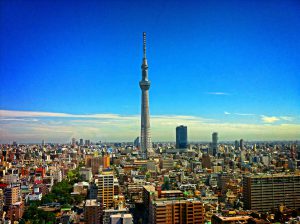Drones flying through the office blaring music to force employees to leave work; workers being forced to don purple “shame capes” for working late — such are the latest strategies in Japan’s continuing struggle against karoshi, or “death by overwork.”

The City of Tokyo.
That nation’s Labor Standards Act allows employers to set their own standards for overtime, meaning most of the work is “off the clock” and uncompensated. Also, the Japanese culture prides itself on a work ethic that equates to long hours on the job, whatever and wherever it may be.
This work ethic has its roots in struggling postwar Japan, when Prime Minister Shigeru Yoshida arm twisted major companies into promising lifelong employment in return for “worker loyalty.” (Such loyalty led a European Economic Community director in the 1970s to dub the Japanese “workaholics who live in rabbit hutches.”)
Two recent cases of karoshi have gotten the attention of Prime Minister Shinzo Abe, who has promised a skeptical nation that he’ll come up with “work balance” laws to prevent further tragedies.
In 2013, NHK television journalist Miwa Sado, 31, logged 159 hours of overtime in one month, then collapsed and died of heart failure in July. In 2015, a 24-year-old employee of advertising giant Dentsu put in 100 hours of overtime one month before jumping to her death from her balcony — in her company dormitory!
In 2016, the Associated Press (AP) reported:
A survey of 10,000 companies published in Japan’s first white paper on karoshi … found that overtime at more than 20 percent exceeded the 80 hour per month threshold for overwork.
In 2015 alone, 93 suicides and attempted suicides were officially recognized as overwork deaths and eligible for compensation and 96 deaths from heart attacks, strokes and other illnesses were linked to overwork, it said. It listed 1,515 cases of workers or families seeking compensation for overwork-related mental problems.
The Japanese government fines companies for instances of karoshi. Dentsu was socked a whopping $5,000, but did say it would work on finding better “work-life balance” for its employees.
